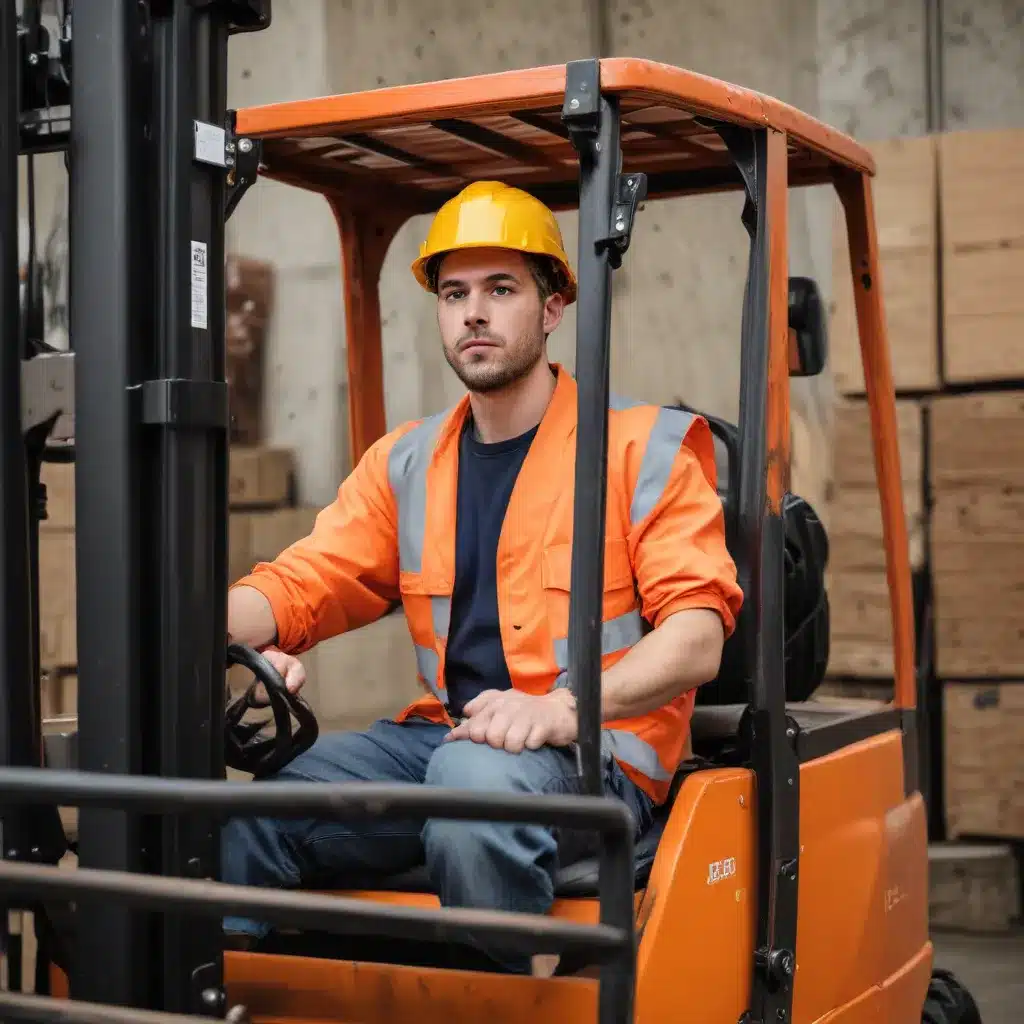
The Importance of PPE in Forklift Operations
Personal Protective Equipment (PPE) is a critical component of workplace safety, serving as the final line of defense against hazards that cannot be fully eliminated through engineering or administrative controls. In the realm of forklift operations, PPE plays a crucial role in safeguarding operators from the various risks inherent to this equipment, including falling objects, tip-overs, collisions, and exposure to environmental hazards.
Forklift operators face a unique set of challenges when it comes to PPE use. The nature of their work requires a high level of mobility, dexterity, and situational awareness – factors that can be impacted by the physical and cognitive demands of wearing protective gear. Understanding the impact of PPE on stress and performance is essential for optimizing forklift safety and productivity.
Stress Factors Associated with PPE Use
The use of PPE by forklift operators can contribute to increased physical and psychological stress. Some of the key factors contributing to this stress include:
Thermal Strain and Overheating
Forklift operators often work in hot, confined environments, and the additional layers of protective clothing can exacerbate heat stress. The inability to dissipate body heat efficiently can lead to fatigue, dehydration, and reduced cognitive function, all of which can compromise safety and performance.
Restricted Mobility and Dexterity
Bulky or ill-fitting PPE, such as heavy gloves or cumbersome coveralls, can limit an operator’s range of motion and fine motor skills. This can make it more challenging to maneuver the forklift, handle loads, and respond quickly to changing conditions, potentially increasing the risk of accidents.
Communication Difficulties
PPE that covers the face or muffles speech, such as respirators or full-face shields, can impede clear communication between forklift operators and their colleagues or supervisors. This can lead to misunderstandings, delays in responding to instructions or warnings, and a general sense of isolation and stress.
Cognitive Demands
The added physical and sensory burdens of wearing PPE can increase the cognitive load on forklift operators, distracting them from their primary tasks and requiring greater mental effort to maintain situational awareness and make split-second decisions.
Impact on Forklift Operator Performance
The stress factors associated with PPE use can have a significant impact on the performance and productivity of forklift operators. Studies have shown that the use of PPE can result in:
-
Reduced Physical Capacity: The added weight and restrictions of PPE can lead to faster onset of fatigue, reduced endurance, and decreased strength, all of which can impact an operator’s ability to perform their duties effectively.
-
Decreased Situational Awareness: The sensory limitations and cognitive demands of PPE can make it more challenging for operators to maintain a comprehensive understanding of their surroundings, potentially increasing the risk of accidents and collisions.
-
Impaired Decision-Making: Stress and cognitive strain can compromise an operator’s ability to quickly and accurately assess situations, make informed decisions, and respond appropriately, which is crucial for safe and efficient forklift operations.
-
Lower Productivity: The combined effects of physical, sensory, and cognitive challenges can result in slower task completion, more errors, and reduced overall productivity, potentially impacting the organization’s operational efficiency and profitability.
Strategies for Mitigating the Negative Impacts of PPE
To address the challenges posed by PPE use and optimize forklift safety and performance, a multifaceted approach is required. Some key strategies include:
Ergonomic PPE Design
Collaborating with PPE manufacturers to develop forklift-specific protective gear that balances safety, comfort, and functionality can help minimize the physical and cognitive burdens on operators. Features such as lightweight materials, improved breathability, and enhanced dexterity can contribute to a better user experience.
Comprehensive Training and Education
Providing comprehensive training on the proper selection, use, and maintenance of PPE can help forklift operators better understand the importance of protective equipment and develop the necessary skills to use it effectively. This can include hands-on practice, troubleshooting scenarios, and regular refresher courses.
Organizational Policies and Procedures
Implementing clear policies and procedures regarding PPE use, including regular inspections, replacement schedules, and enforcement measures, can help ensure that forklift operators consistently use the appropriate protective equipment and maintain it in good condition.
Stress Management Initiatives
Incorporating stress management techniques, such as relaxation exercises, hydration breaks, and mental health support, can help forklift operators better cope with the physical and psychological demands of their work, ultimately enhancing their overall performance and well-being.
Continuous Improvement
Regularly reviewing and analyzing forklift safety data, operator feedback, and industry best practices can help organizations identify areas for improvement and implement targeted interventions to optimize the use of PPE and minimize its negative impacts on forklift operations.
By addressing the challenges associated with PPE use and adopting a comprehensive approach to forklift safety, organizations can foster a work environment that prioritizes the well-being and performance of their forklift operators, ultimately contributing to improved productivity, reduced incidents, and a more sustainable logistics operation.
Conclusion
Forklift operations are inherently hazardous, and the use of personal protective equipment is essential for safeguarding operators from the risks they face. However, the physical and cognitive demands of wearing PPE can contribute to increased stress and compromised performance, which can have far-reaching consequences for both worker safety and organizational efficiency.
To address this challenge, a multidisciplinary approach is required, involving the design of ergonomic PPE, comprehensive training and education, the implementation of effective organizational policies and procedures, and the incorporation of stress management initiatives. By prioritizing the well-being and performance of forklift operators, organizations can create a safer, more productive, and more sustainable logistics environment.
For more information on forklift safety, maintenance, and industry trends, be sure to visit Forklift Reviews.

